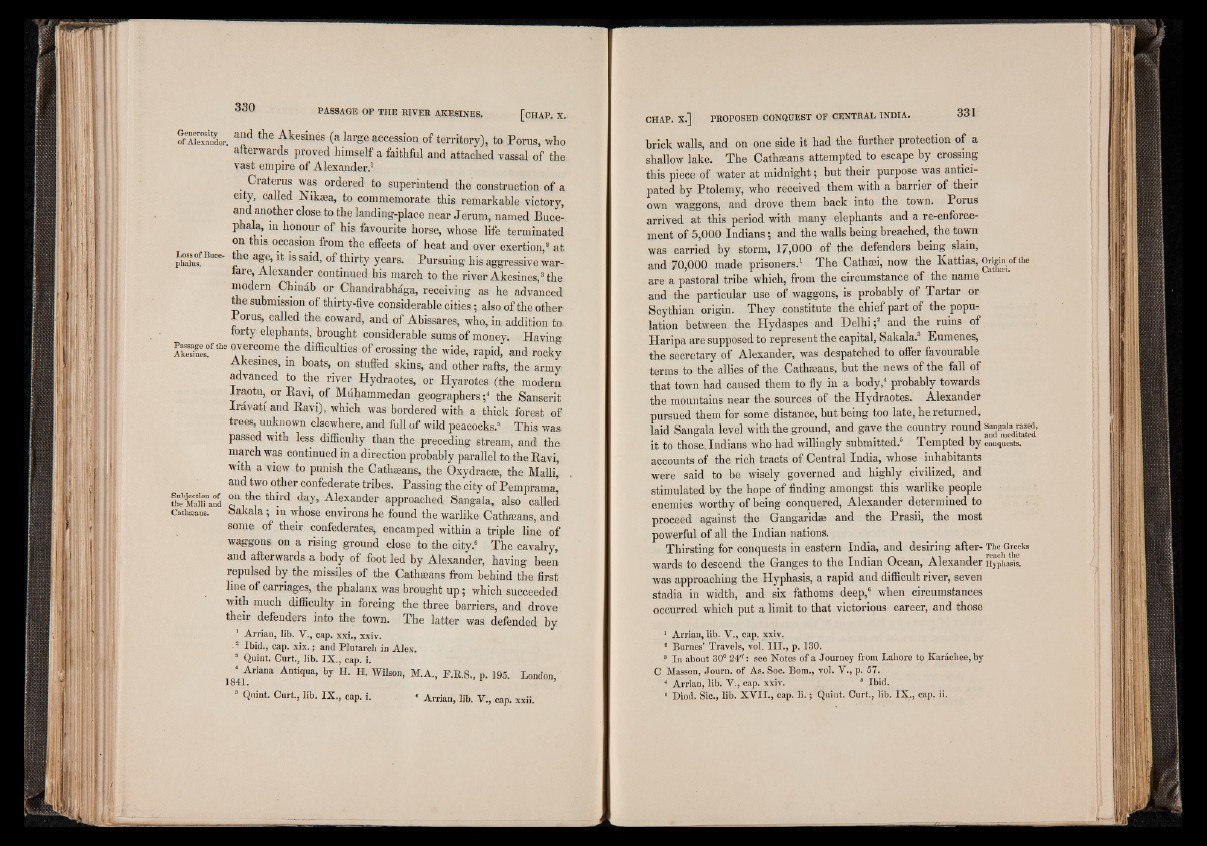
Generosity
of Alexander.
Loss of Bucephalus.
Passage of the
Akesines.
Subjection of
the Malli and
Cath&ans.
and the Akesines (a large accession of territory), to Porus, who
afterwards proved himself a faithful and attached vassal of the
vast empire of Alexander.1
Craterus was ordered to superintend the construction of a
city, called Nikaea, to commemorate this remarkable victory,
and another close, to the landing-place near Jerum, named Buce-
phala, in honour of his favourite horse, whose life terminated
on this occasion from the effects of heat and over exertion,2 at
the age, it is said, of thirty years. Pursuing his aggressive warfare,
Alexander continued his march to the river Akesines,3 the
modern Chinab or Chandrabhaga, receiving as he advanced
the submission of thirty-five considerable cities; also of the other
Porus, called the; coward, and of Abissares, who, in addition to
forty elephants, brought considerable sums of money. Having
overcome the difficulties of crossing the wide, rapid, and rocky
Akesines, in boats, on stuffed skins, and other rafts, the army
advanced to the river Hydraotes, or Hyarotes (the modern
Iraotm or Bavi, of Muhammedan geographers ;4 the Sanscrit
Iravati and Bavi), which was bordered with a thick forest of
trees, unknown elsewhere, and full of wild peacocks.5 This was
passed with less difficulty than the preceding stream, and the:
march was continued in a direction probably parallel to the Bavi,
with a view to punish the Cathseans, the Oxydracse, the Malli'
and two other confederate tribes. Passing the city of Pemprama,
on the third day, Alexander approached Sangala, also called
Sakala; in whose environs he found the warlike Cathseans, and
some of their confederates, encamped within a triple line of
waggons on a rising ground close to. the city.6 The cavalry,
and afterwards a body of foot led by Alexander, having been
repulsed by the missiles of the Cathseans from behind the first
line of carriages, the phalanx was brought up; which succeeded
with much difficulty in forcing the three barriers, and drove
their defenders into the town. The latter was defended by
1 Arrian, lib. V., cap. xxi., xxiv.
8 Ibid., cap. x ix .; and Plutarch in Alex,
3 Quint. Curt., lib. IX ., cap. i.
1841Anana ‘A"nti<!Ua’ by H ' WiIson> M.A., F.R.S., p. 195, London,
5 Quint. Curt., lib. IX ., cap. i. « Arrian, lib. V., cap. xxii.
brick walls, and on one side it had the further protection of a
shallow lake. The Cathseans attempted to escape by crossing
this piece of water at midnight | but their purpose was anticipated
by Ptolemy, who received them with a barrier of their
own waggons, and drove them back into the town. Porus
arrived at this period with many elephants and a re-enforcement
of 5,000 Indians; and the walls being breached, the town
was carried by storm, 17,000 of the defenders being slain,
and 70,000 made prisoners.1 The Cathsei, now the Kattias, Ongm ofthe
are a pastoral tribe which, from the circumstance of the name
and the particular use of waggons, is probably of Tartar or
Scythian origin. They constitute the chief part of the population
between the Hydaspes and Delhi ;2 and the ruins of
Haripa are supposed to represent the capital, Sakala.3 Eumenes,
the secretary of Alexander, was despatched to offer favourable
terms to the allies of the Cathseans, but the news of the fall of
that town had caused them to fly in a body,4 probably towards
the mountains near the sources of the Hydraotes. Alexander
pursued them for some distance, hut being too late, he returned,
laid Sangala level with the ground, and gave the country round SangaUrazed,
it to those. Indians who had willingly submitted.5 Tempted by conquest»,
accounts of the rich tracts of Central India, whose inhabitants
were said to be wisely governed and highly civilized, and
stimulated by the hope of finding amongst this warlike people
enemies worthy of being conquered, Alexander determined to
proceed against the Gangaridse and the Prasii, the most
powerful of all the Indian nations.
Thirsting for conquests in eastern India, and desiring after- Th^Greeks
wards to descend the Ganges to the Indian Ocean, Alexander Hjphasis.
was approaching the Hyphasis, a rapid and difficult river, seven
stadia in width, and six fathoms deep,6 when circumstances
occurred which put a limit to that victorious career, and those
1 Arrian, lib. V., cap. xxiv.
8 Burnes’ Travels, vol. I I I . , p. 130.
8 In about 30° 24": see Notes of a Journey from Lahore to Karachee, by
C. Masson, Journ. of As. Soc. Bom., vol. V., p. 57.
4 Arrian, lib. V., cap. xxiv. 5 Ibid.
e Diod. Sic., lib. X V I I ., cap. li. ; Quint. Curt., lib. IX ., eap. ii.